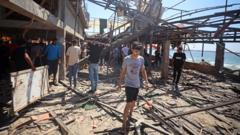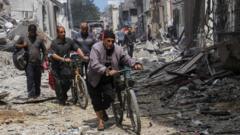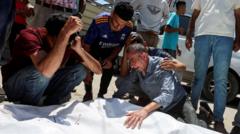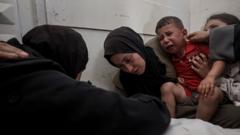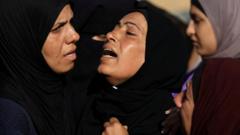After enduring relentless drone assaults from the Rapid Support Forces, Port Sudan has plunged into chaos, with skyrocketing water prices and power shortages complicating daily life for its inhabitants. Residents describe a shift from safety to fear, as previously secure conditions have deteriorated drastically.
Port Sudan Faces Dire Humanitarian Crisis Amid Recent Aerial Attacks
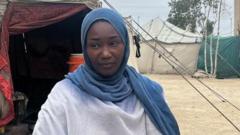
Port Sudan Faces Dire Humanitarian Crisis Amid Recent Aerial Attacks
Residents of Port Sudan struggle for water and power following an intense week of bombing, igniting fears of escalating humanitarian challenges.
In the wake of a week of aerial bombardments by the Rapid Support Forces (RSF), Port Sudan has transformed from a safe haven to a city grappling with a severe humanitarian crisis. Once regarded as a refuge amid Sudan's ongoing civil war, it is now suffering from a critical shortage of water and power as smoke continues to billow from targeted fuel depots.
The city, which previously offered a semblance of stability, has seen water prices surge dramatically. Mutasim, a 26-year-old resident displaced from Omdurman, shared troubling experiences with the BBC, stating that the cost of a daily water supply soared from 2,000 Sudanese pounds ($3.30) to 10,000 pounds ($16.60) within a week. Deprived of affordable water, he and his family face challenges in cooking, cleaning, and maintaining a basic standard of living.
As markets remain open, porters of fuel navigate long lines at gas stations, often waiting hours to fill their tanks. “I could spend five hours just to get petrol,” Mutasim lamented, highlighting an increasingly desperate situation where the struggle for fuel has become a norm.
Before last week's attacks, Port Sudan had provided comfort to many fleeing the conflict. Mutasim described the sacrifices made to relocate to what they thought would be a safer environment, investing their life savings of $3,000 to escape the clutches of the RSF. With insecurity now escalating in Port Sudan, the question looms: "Where do we go from here?"
Power outages have compounded the hardships facing residents for the past two weeks, exacerbated by the drone strikes. Those like Mutasim's 70-year-old aunt grapple with oppressive heatwaves in the absence of electricity, leaving people restless and anxious through sweltering nights.
Refugee Hawa Mustafa, who fled Darfur with her children, voiced her dismay at the recurrence of conflict and insecurity. She painted a grim picture of fear prevailing among the displaced, saying, "The drones came to us and we returned to a state of war." Without her husband, who remains trapped by violence, she struggles daily to protect and provide for her family amidst mounting uncertainty.
Mariam Atta, another resident, encapsulated the sentiment with stark simplicity: "Life has changed completely. We are struggling to cope." The reality of extreme hardship has become widespread as humanitarian agencies, previously reliant on Port Sudan as a vital distribution hub, now express anxiety over disrupted aid flows amidst rising violence.
Leni Kinzli from the World Food Programme emphasized Port Sudan's crucial role in delivering food supplies across the country, revealing that 20,000 metric tonnes of food were funneled through the city in March alone. However, the recent attacks threaten to severely impair access to essential resources, forcing the organization to explore alternative routes for aid delivery, a complicated task given the circumstances.
As night falls across Port Sudan, silence replaces the vibrant scenes of life as residents heed the call for security, choosing to stay indoors. Lost are the evenings filled with communal gatherings along the coast and the simple pleasure of watching football in local cafés. The combination of blackout and fear has shifted the city into a new reality— one where safety and survival have taken precedence over normalcy.
The city, which previously offered a semblance of stability, has seen water prices surge dramatically. Mutasim, a 26-year-old resident displaced from Omdurman, shared troubling experiences with the BBC, stating that the cost of a daily water supply soared from 2,000 Sudanese pounds ($3.30) to 10,000 pounds ($16.60) within a week. Deprived of affordable water, he and his family face challenges in cooking, cleaning, and maintaining a basic standard of living.
As markets remain open, porters of fuel navigate long lines at gas stations, often waiting hours to fill their tanks. “I could spend five hours just to get petrol,” Mutasim lamented, highlighting an increasingly desperate situation where the struggle for fuel has become a norm.
Before last week's attacks, Port Sudan had provided comfort to many fleeing the conflict. Mutasim described the sacrifices made to relocate to what they thought would be a safer environment, investing their life savings of $3,000 to escape the clutches of the RSF. With insecurity now escalating in Port Sudan, the question looms: "Where do we go from here?"
Power outages have compounded the hardships facing residents for the past two weeks, exacerbated by the drone strikes. Those like Mutasim's 70-year-old aunt grapple with oppressive heatwaves in the absence of electricity, leaving people restless and anxious through sweltering nights.
Refugee Hawa Mustafa, who fled Darfur with her children, voiced her dismay at the recurrence of conflict and insecurity. She painted a grim picture of fear prevailing among the displaced, saying, "The drones came to us and we returned to a state of war." Without her husband, who remains trapped by violence, she struggles daily to protect and provide for her family amidst mounting uncertainty.
Mariam Atta, another resident, encapsulated the sentiment with stark simplicity: "Life has changed completely. We are struggling to cope." The reality of extreme hardship has become widespread as humanitarian agencies, previously reliant on Port Sudan as a vital distribution hub, now express anxiety over disrupted aid flows amidst rising violence.
Leni Kinzli from the World Food Programme emphasized Port Sudan's crucial role in delivering food supplies across the country, revealing that 20,000 metric tonnes of food were funneled through the city in March alone. However, the recent attacks threaten to severely impair access to essential resources, forcing the organization to explore alternative routes for aid delivery, a complicated task given the circumstances.
As night falls across Port Sudan, silence replaces the vibrant scenes of life as residents heed the call for security, choosing to stay indoors. Lost are the evenings filled with communal gatherings along the coast and the simple pleasure of watching football in local cafés. The combination of blackout and fear has shifted the city into a new reality— one where safety and survival have taken precedence over normalcy.


